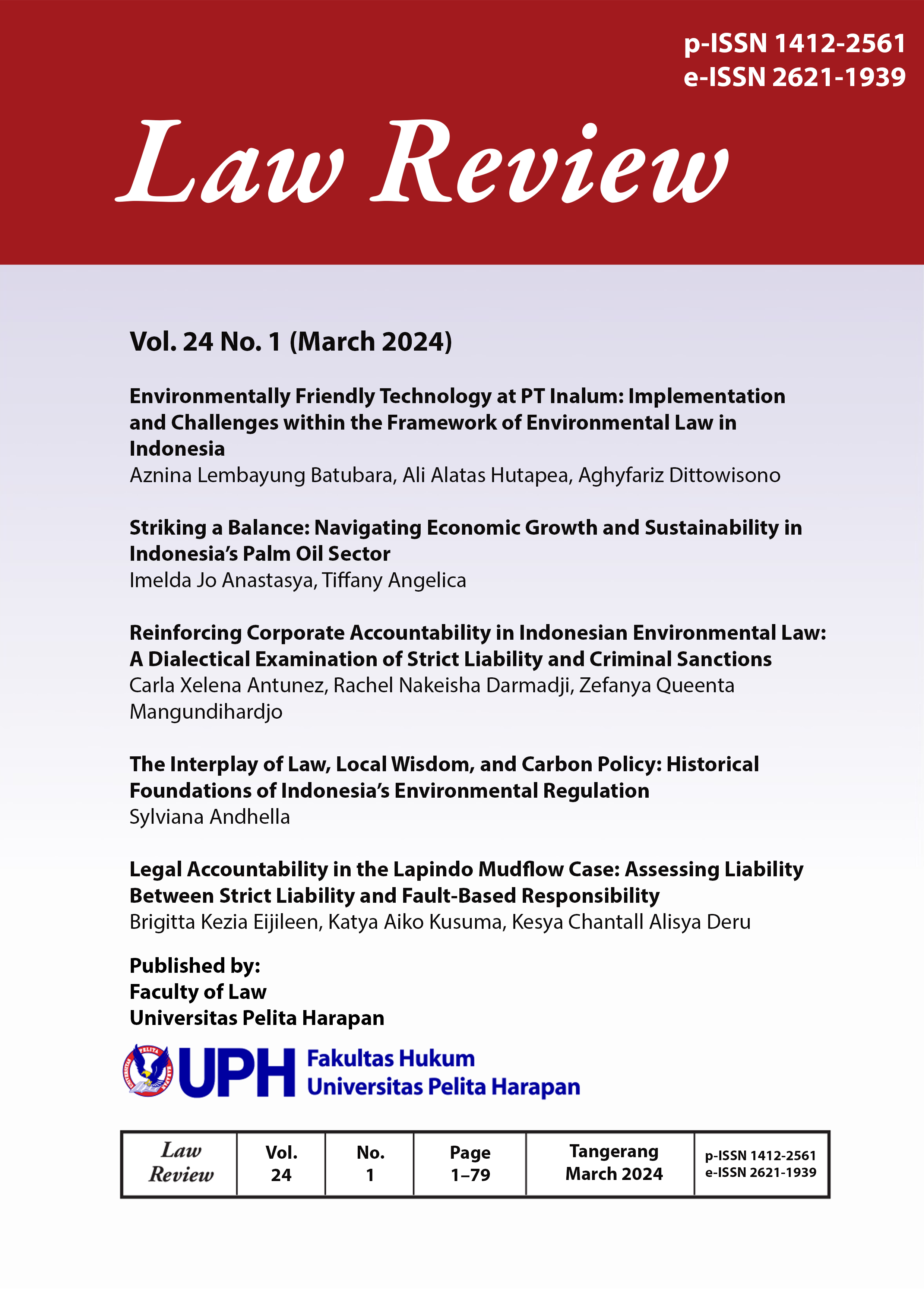Legal Accountability in the Lapindo Mudflow Case: Assessing Liability Between Strict Liability and Fault-Based Responsibility
DOI:
https://doi.org/10.19166/lr.v24i1.9753Λέξεις-κλειδιά:
Strict Liability, Oil Drilling, Environmental DamagesΠερίληψη
Strict liability is a form of liability where a party is held accountable for the damage or harm caused by action of the party regardless of intent or fault. Strict liability is typically imposed in industries where inherently risky activities are undertaken, e.g., hazardous waste disposal, nuclear power, or the manufacture of chemicals. This research evaluates if the concept of strict liability is appropriate for the Lapindo mudflow. A qualitative approach allows for an in-depth analysis of the legal principles and arguments that have underpinned the handling of the Lapindo case. The application of strict liability principle is connected with PT Lapindo Brantas, a construction company appointed by BPMIGAS to perform oil drilling and natural gas. The eruption of mudflow was caused by the drilling activities of PT Lapindo Brantas, which were risky in nature and led to devastating consequences on the surrounding communities. Since the drilling activities are perilous in nature, particularly in an area of high subsurface instability potential, strict liability could be imposed. The damage caused by the mudflow—property loss, people displacement, and degradation of the environment—was the direct result of the activities of the company. In strict liability, PT Lapindo would have been responsible for the harm, regardless of whether their action was negligent or intentional, because drilling in this area can be considered an inherently dangerous act.
Αναφορές
Laws and Regulations
Republic of Indonesia Law Number 32 Year 2009 on Environmental Protection and Management.
Books
Marzuki, Peter Mahmud. Penelitian Hukum. Jakarta: Kencana, 2017.
Salim, H. S., and Erlies Septiana Nurbani. Metode Penelitian Hukum: Pengantar dan Penerapannya. Jakarta: Rajawali Press, 2014.
Soerjono, Soekanto, and Sri Mamudji. Penelitian Hukum Normatif: Suatu Tinjauan Singkat. Depok: RajaGrafindo Persada, 2003.
Wibisana, Andri G. Penegakan Hukum Lingkungan melalui Pertanggungjawaban Perdata. Depok: Badan Penerbit Fakultas Hukum Universitas Indonesia, 2018.
Journal Articles
Devi, Navaratu Annisa, and Ikhwan Aulia Fatahillah. “Analisis Yuridis Kasus Lumpur Lapindo dalam Perspektif Hukum Lingkungan di Indonesia.” CAUSA Jurnal Hukum dan Kewarganegaraan 6, no. 4 (2024): 1–4. https://ejournal.warunayama.org/index.php/causa/article/view/6167
Fatichah, Sammah, Achmad Irwan Ramzani, and Kus Rizkianto. “Problematika Pertanggungjawaban Korporasi Atas Kejahatan Ekosida di Indonesia.” Salam: Jurnal Sosial dan Budaya Syar-i 10, no. 1 (2023): 183–98. https://doi.org/10.15408/sjsbs.v10i1.31114
Goldberg, John C. P., and Benjamin C. Zipursky. “The Strict Liability in Fault and the Fault in Strict Liability.” Fordham Law Review 85, no. 2 (2016): 743–86. https://ir.lawnet.fordham.edu/flr/vol85/iss2/16
Latifaturrohmah, Tsabita, and Rohmat Junarto. “Perlindungan, Penegakan, dan Pemenuhan Hak atas Tanah Korban Lumpur Lapindo.” Tunas Agraria 6, no. 1 (2023): 56–70. https://doi.org/10.31292/jta.v6i1.204
Malik, Abdul Haris, Sanusi, and Fajar Ari Sudewo. “Corporate Strict Liability in Environmental Crimes in Indonesia and the Netherlands.” EAI Proceedings (2022): 1–9. https://doi.org/10.4108/eai.28-5-2022.2320558
Malik, Abdul Haris, Sanusi, and Fajar Ari Suderwo. “Pertanggungjawaban Pidana Korporasi di Bidang Lingkungan Hidup.” Refleksi Hukum 9, no. 1 (2022): 1–9. https://doi.org/10.4108/eai.28-5-2022.2320558
Maria, Juliya. “Analisis Yuridis Terhadap Pengelolaan Sumber Daya Alam oleh PT Lapindo Brantas yang Menyebabkan Bencana.” Bina Hukum Lingkungan 1, no. 1 (2018): 1–107. http://repository.umsu.ac.id/xmlui/bitstream/handle/123456789/2134/Tesis%20Juliya%20Maria.pdf?sequence=1&isAllowed=y
Mulyono, Andreas, and Rizky Karo Karo. “Questioning a Fair Settlement as the Legal Resolution of Global Interests.” IOP Conference Series: Earth and Environmental Science 1270 (2023): 1–10. https://doi.org/10.1088/1755-1315/1270/1/012025
Nurhalizah, Aisyah. “Mengubah Bencana Alam Lumpur Lapindo Menjadi Energi Terbarukan Sebagai Bahan Bakar Transportasi Ramah Lingkungan.” Forschungsforum Law Journal 1, no. 2 (2024): 73–84. http://dx.doi.org/10.35586/flj.v1i02.7218
Rasyidi, Brahmantiyo, Gunawan Nachrawi, and Juwita. “The Principle of Strict Liability in Prosecuting Environmental Criminal Actions by Corporations.” Jurnal Humaniorum: Jurnal Hukum dan Ilmu Sosial 1, no. 2 (2023): 41–47. https://doi.org/10.37010/hmr.v1i02.13
Rokhim, Abdul. “Degradasi Norma ‘Strict Liability’ dalam Penegakan Hukum Lingkungan.” Yurispruden 5, no. 2 (2022): 178–95. https://doi.org/10.33474/yur.v5i2.14627
Romsan, Achmad, and Suzanna Mohamed Isa. “Corporate Responsibility for Environmental Human Rights Violation: A Case Study of Indonesia.” Pertanika Journal of Social Sciences & Humanities 22, no. S (2014): 111–30. https://www.researchgate.net/publication/292858000_Corporate_responsibility_for_environmental_human_rights_violation_A_case_study_of_Indonesia
Suryani, Nilma. “Penegakan Hukum Pidana Lumpur Lapindo Masih Jauh dari Harapan.” Bina Hukum Lingkungan 1, no. 1 (2016): 1–9. https://bhl-jurnal.or.id/index.php/bhl/article/view/51
Wardhani, Waya Muthia, and Fidelis Arastyo Andono. “Implikasi Tanggung Jawab Sosial dan Lingkungan Terkait Potensi Dugaan Kejahatan Korporasi: Studi Content Analysis pada PT Lapindo Brantas Inc.” Jurnal Akuntansi Bisnis 10, no. 1 (2022): 54–72. https://journal.ubm.ac.id/index.php/akuntansi-bisnis/article/viewFile/987/868
Wulandari, Purnomo, and Sri Endah Wahyuningsih. “The Strict Liability by Corporate in Enforcement of Environmental Law.” Law Development Journal 2, no. 4 (2020): 477-488. https://www.researchgate.net/publication/358428352_The_Strict_Liability_by_Corporate_in_Enforcement_of_Environmental_Law .
Yunita, Erva, and Irwan Triadi. “Tindak Pidana dalam Kasus Lumpur Lapindo (Terkait dengan Undang-Undang Nomor 32 Tahun 2009 tentang Perlindungan dan Pengelolaan Lingkungan Hidup).” Amandemen: Jurnal Ilmu Pertahanan, Politik, dan Hukum Indonesia 1, no. 3 (2024): 92–102. https://doi.org/10.62383/amandemen.v1i3.263
Λήψεις
Δημοσιευμένα
Πώς να δημιουργήσετε Αναφορές
Τεύχος
Ενότητα
Άδεια
Πνευματική ιδιοκτησία (c) 2025 Kesya Chantall Alisya Deru, Brigitta Kezia Eijileen, Katya Aiko Kusuma

Αυτή η εργασία είναι αδειοδοτημένη υπό το CC Αναφορά Δημιουργού – Μη Εμπορική Χρήση 4.0.
Authors who publish with this journal agree to the following terms:
1) Authors retain copyright and grant the journal right of first publication with the work simultaneously licensed under a Creative Commons Attribution License (CC-BY-SA 4.0) that allows others to share the work with an acknowledgement of the work's authorship and initial publication in this journal.
2) Authors are able to enter into separate, additional contractual arrangements for the non-exclusive distribution of the journal's published version of the work (e.g., post it to an institutional repository or publish it in a book), with an acknowledgement of its initial publication in this journal.
3) Authors are permitted and encouraged to post their work online (e.g., in institutional repositories or on their website). The final published PDF should be used and bibliographic details that credit the publication in this journal should be included.





